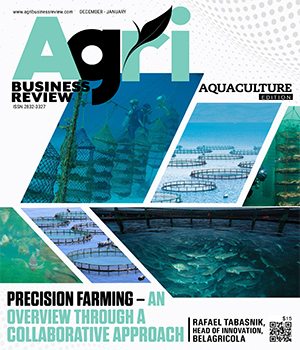A majority women-owned, BlueTech startup, Radmantis serves as a leader in the aquaculture space committed to transforming the way fish are managed.
“Current fish farming methods are heavily dependent on physical handling of the fish that often results in significant damages, including stresses, injuries, and susceptibility to disease,” says Robert Huber, co-founder of Radmantis. “Our mission is to replace manual handling of the fish with uncrewed alternatives to ensure resilient, sustainable, and efficient aquaculture operations.”
Founded by two systems biologists looking to create robust solutions for real-world issues, Radmantis is bringing automation to the handling and processing of aquatic animals in commercial aquaculture facilities. To this end, it delivers a robotic fish management system that uses AI and machine learning to interact with fish in less intrusive ways.
This patented technology comes with a modular uncrewed fish management device developed by combining AI-driven automated tools, aquatic imaging, and a deep understanding of sensory ecology and fish behavior. Fish transiting the device are assessed with AI-based image detection and gated towards one of several designated exits.
The flexible and highly adaptable image classification model characterizes fish based on their phenotypic characteristics, allowing mechanisms for size-specific harvesting or size-grading. Recent efforts, funded by a USDA research program, aim to route healthy fish through one exit while directing problematic ones to a separate containment area for closer examination by skilled veterinarians. Radmantis’ technology is designed to flag a number of biosecurity threats, visualize parasitic infections, and differentiate fish based on size. Today, working with early adopters, the company deploys its devices targeting common tasks, like size grading, health and size monitoring, and separating fish for enhanced and more resilient production.
Growers leveraging the Radmantis technology can seamlessly enhance fish farming production, by minimizing manual intervention and lowering background mortality, while ensuring, more effective task workflows and superior product quality. The ability to effectively tackle operational inefficiencies and risks significantly contributes to aquaculture’s sustainability and enhanced food security.
Radmantis technology is currently focused on recirculation agriculture systems (RAS) terrestrial-based fish farms for high-value fish such as salmon, yellowtail, seabream, and similar species. It has validated the device in a small-scale, commercial, indoor rainbow trout farm, cultivating a market-size population with established aquaculture practices.
 With ongoing refinements and training, Radmantis is expanding the technology’s capabilities to discern size, genotype, and stress and injury metrics in salmon at LocalCoho in Auburn, New York, a producer of premium salmon for the US market.
With ongoing refinements and training, Radmantis is expanding the technology’s capabilities to discern size, genotype, and stress and injury metrics in salmon at LocalCoho in Auburn, New York, a producer of premium salmon for the US market.
Initially designed for agricultural uses, a field-deployed version of the device has been adapted as a species-specific smart trap for invasive fish species. Many fragile aquatic ecosystems face threats from invasive species such as carp in the Mississippi watershed and invasive parasitic sea lampreys in the Great Lakes, which have been devastating local fisheries since their introduction at the turn of the century. Radmantis’ technology presents a proactive solution for population control to address these issues as it partners with diverse private and government stakeholders to combat ecological disruptions caused by species across multiple habitats.
The company continues to focus on bringing innovative solutions for sustainable aquaculture through strategic partnerships. For example, it has partnered with MassRobotics, Boston, to further advance the AI and robotics components of Radmantis technology. Collaborating with the USDA-funded Freshwater Institute in Shepherdstown, WV, the company is pioneering precision fish farming technologies. Funding from a series of NOAA and NSF grants empower the company to advance precision technologies in fish management.
Dedicated to transforming the aquaculture industry at a fundamental level, Radmantis envisions this innovation being integrated into the planning of future facilities at the earliest design stage, driving the application of uncrewed technologies in fish farming while simultaneously enhancing fish welfare.
“Current fish farming methods are heavily dependent on physical handling of the fish that often results in significant damages, including stresses, injuries, and susceptibility to disease,” says Robert Huber, co-founder of Radmantis. “Our mission is to replace manual handling of the fish with uncrewed alternatives to ensure resilient, sustainable, and efficient aquaculture operations.”
Our mission is to replace manual handling of the fish to ensure resilient, sustainable, and efficient aquaculture practices
This patented technology comes with a modular uncrewed fish management device developed by combining AI-driven automated tools, aquatic imaging, and a deep understanding of sensory ecology and fish behavior. Fish transiting the device are assessed with AI-based image detection and gated towards one of several designated exits.
The flexible and highly adaptable image classification model characterizes fish based on their phenotypic characteristics, allowing mechanisms for size-specific harvesting or size-grading. Recent efforts, funded by a USDA research program, aim to route healthy fish through one exit while directing problematic ones to a separate containment area for closer examination by skilled veterinarians. Radmantis’ technology is designed to flag a number of biosecurity threats, visualize parasitic infections, and differentiate fish based on size. Today, working with early adopters, the company deploys its devices targeting common tasks, like size grading, health and size monitoring, and separating fish for enhanced and more resilient production.
Growers leveraging the Radmantis technology can seamlessly enhance fish farming production, by minimizing manual intervention and lowering background mortality, while ensuring, more effective task workflows and superior product quality. The ability to effectively tackle operational inefficiencies and risks significantly contributes to aquaculture’s sustainability and enhanced food security.
Radmantis technology is currently focused on recirculation agriculture systems (RAS) terrestrial-based fish farms for high-value fish such as salmon, yellowtail, seabream, and similar species. It has validated the device in a small-scale, commercial, indoor rainbow trout farm, cultivating a market-size population with established aquaculture practices.
 With ongoing refinements and training, Radmantis is expanding the technology’s capabilities to discern size, genotype, and stress and injury metrics in salmon at LocalCoho in Auburn, New York, a producer of premium salmon for the US market.
With ongoing refinements and training, Radmantis is expanding the technology’s capabilities to discern size, genotype, and stress and injury metrics in salmon at LocalCoho in Auburn, New York, a producer of premium salmon for the US market. Initially designed for agricultural uses, a field-deployed version of the device has been adapted as a species-specific smart trap for invasive fish species. Many fragile aquatic ecosystems face threats from invasive species such as carp in the Mississippi watershed and invasive parasitic sea lampreys in the Great Lakes, which have been devastating local fisheries since their introduction at the turn of the century. Radmantis’ technology presents a proactive solution for population control to address these issues as it partners with diverse private and government stakeholders to combat ecological disruptions caused by species across multiple habitats.
The company continues to focus on bringing innovative solutions for sustainable aquaculture through strategic partnerships. For example, it has partnered with MassRobotics, Boston, to further advance the AI and robotics components of Radmantis technology. Collaborating with the USDA-funded Freshwater Institute in Shepherdstown, WV, the company is pioneering precision fish farming technologies. Funding from a series of NOAA and NSF grants empower the company to advance precision technologies in fish management.
Dedicated to transforming the aquaculture industry at a fundamental level, Radmantis envisions this innovation being integrated into the planning of future facilities at the earliest design stage, driving the application of uncrewed technologies in fish farming while simultaneously enhancing fish welfare.
Thank you for Subscribing to Agri Business Review Weekly Brief



